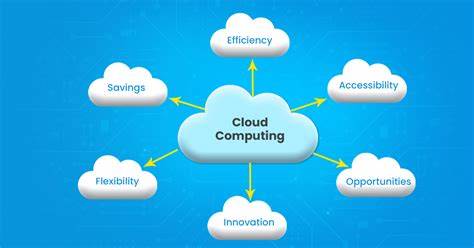
What are the Benefits of Cloud Computing in Businesses?
In the ever-evolving landscape of business operations, the adoption of cloud computing in businesses has emerged as a game-changer. Small businesses, in particular, have found a myriad of advantages in harnessing the power of the cloud. This blog will explore the benefits of cloud computing in businesses, delve into its significance in software development, help you determine whether it’s the right fit for your business, and also shed light on the potential drawbacks.
Also Read: How Cyber Security Protects Us from Viruses?
Table of Contents
Benefits of Cloud Computing in Businesses

- Cost-Efficiency: One of the most appealing aspects of cloud computing is its cost-effectiveness. Small businesses can save significant amounts on IT infrastructure and maintenance. With cloud services, you pay for what you use, eliminating the need for large upfront investments.
- Scalability: Cloud computing provides the flexibility to scale up or down according to your business needs. This adaptability allows small businesses to grow without the worry of outgrowing their IT resources.
- Accessibility: Cloud services are accessible from anywhere with an internet connection. This means that your team can work remotely, which has become increasingly important in today’s world.
- Security: Cloud service providers invest heavily in security, often more than what small businesses can afford. This results in enhanced data protection and disaster recovery options.
- Automatic Updates: Software and security updates are taken care of by the cloud provider, reducing the burden on your IT department.
- Competitive Edge: Small businesses can access the same cutting-edge technologies as larger competitors, leveling the playing field.
- Collaboration: Cloud platforms often include collaboration tools that facilitate teamwork, document sharing, and communication.
- Resource Optimization: With cloud computing, you can allocate resources dynamically, ensuring that you’re only using what you need when you need it, which optimizes cost.
The Importance of Cloud Computing in Software Development
In the world of software development, the cloud offers a range of advantages:
- Collaboration: Developers and teams can collaborate seamlessly, working on the same codebase from different locations. This enhances productivity and fosters innovation.
- Storage and Data Management: The cloud provides ample storage space for code repositories, databases, and other development assets. This makes it easier to manage and secure sensitive data.
- Testing and Deployment: The cloud allows for easy testing and deployment of software applications, which is crucial for a dynamic development environment.
- Scalability: Software applications developed in the cloud can easily adapt to increased demand, ensuring a smooth user experience even during traffic spikes.
- Reduced Time-to-Market: The cloud streamlines the software development process, reducing the time it takes to go from an idea to a functional product.
- Cost Savings: By eliminating the need to purchase and maintain physical servers, software development costs are significantly reduced.
Also Read: How SMART HOMES Make Your Life Better and Easier?
Is Cloud Computing Right for Your Business?
While cloud computing offers numerous benefits, it’s essential to assess whether it’s the right fit for your business:
- Business Goals: Consider your long-term goals. If you plan to scale rapidly or need the flexibility to accommodate changes, cloud computing may be a good match.
- Budget: Evaluate your budget and determine whether the pay-as-you-go model aligns with your financial plan.
- Security Needs: If your business handles highly sensitive data, ensure that the chosen cloud provider meets your security and compliance requirements.
- IT Expertise: Assess your in-house IT expertise. Cloud computing often requires a certain level of technical knowledge to manage effectively.
- Regulatory Compliance: Ensure that the cloud provider can meet the regulatory requirements specific to your industry.
Disadvantages of Cloud Computing in Businesses
While the advantages are significant, it’s important to acknowledge the potential drawbacks:
- Downtime: Cloud outages can disrupt operations. While providers work to minimize downtime, it’s crucial to have contingency plans in place.
- Data Security Concerns: Although cloud providers invest in security, some businesses may remain concerned about data breaches or privacy issues.
- Dependence on the Internet: Cloud services rely on a stable internet connection. If your connection is unreliable, it may impact productivity.
- Cost Overruns: While cost-effective in many cases, underestimating usage or failing to monitor it can lead to unexpected expenses.
- Limited Control: Small businesses may find themselves with limited control over their infrastructure and data when utilizing cloud services.
- Data Transfer Speed: Uploading and downloading large amounts of data to and from the cloud can be time-consuming if you have a slow internet connection.
In conclusion, cloud computing is a transformative technology that can greatly benefit small businesses. It provides cost savings, scalability, and accessibility, making it particularly attractive. In the world of software development, it enhances collaboration and streamlines development processes. However, whether cloud computing is right for your business depends on your unique needs, budget, security considerations, IT expertise, and regulatory compliance requirements.

